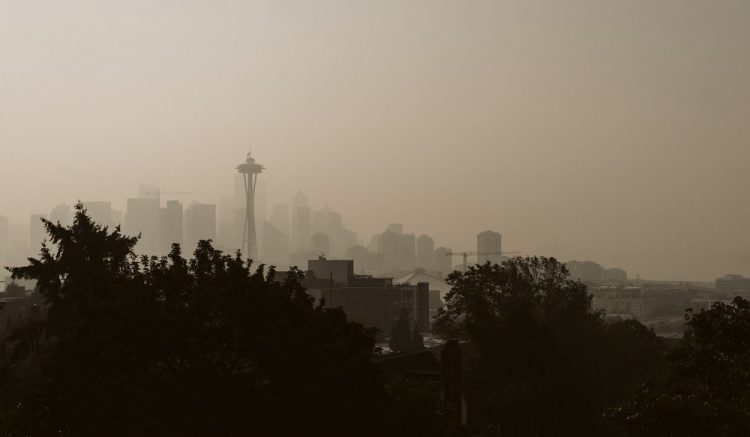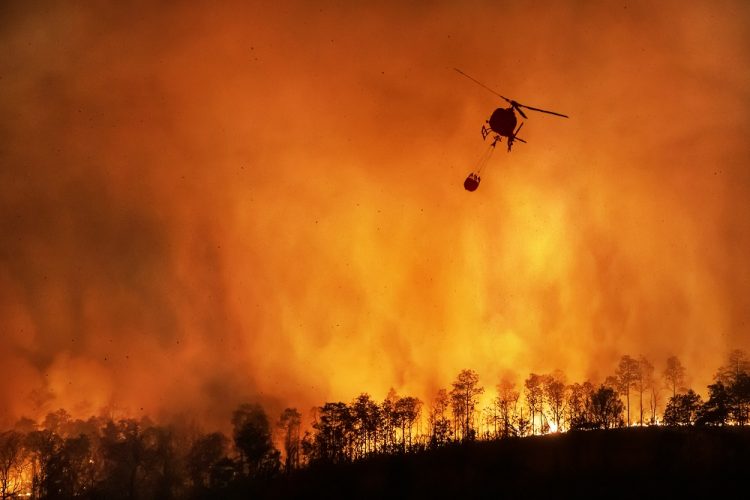July 2, 2024
How to stay safe in wildfire season
 Does it seem like wildfire season has grown longer, more unpredictable and more devastating than it used to be? Do you feel like there are more days of unhealthy, smoky air these days? You’re not imagining.
Does it seem like wildfire season has grown longer, more unpredictable and more devastating than it used to be? Do you feel like there are more days of unhealthy, smoky air these days? You’re not imagining.
According to Professor Justin Angle, a UW alumnus and author of “This is Wildfire,” the western wildfire season runs 80 days longer than it did just 30 years ago.
Research from the United Sates Forest Service confirms the extension of fire season, exacerbated by factors related to global warming. UW researchers predict more megafires for our region, fueled by both climate change and a longstanding policy of fire-suppression.
It all adds up to a new normal, especially in the western U.S. Adapting to this new normal means knowing how to reduce the risk of wildfires and how to protect your home and family.
First, do no harm
Natural fires, often caused by lightning, are a normal part of ecological balance, although they happen unexpectedly and can quickly grow out of control. Accidental fires— caused by us humans — are often sparked by poor choices or careless behavior, such as discarded lit cigarettes, campfires that are not sufficiently dampened, vehicle sparks or fireworks.
Nearly nine out of ten wildfires nationwide are human-caused and completely preventable.
To do your part, recreate responsibly. Whether you’re out camping or enjoying a bonfire in the backyard, make sure you understand the potential for explosions or fire with your equipment and toys. Check that fires and heat sources are fully extinguished before you go to sleep or hit the trail.
And heed burn bans — restrictions from open flames in outdoor settings — that may be issued by local or state authorities when the risk of wildfire is elevated or excess smoke is in the air.
Prepare and be aware
There are many ways to protect yourself and your family from fire and the health risks associated with wildfire smoke. They begin with awareness.
Be aware that fire season now lasts from roughly May through November. It generally begins earlier in the hot, dry Southwest and moves north as the season wears on. in 2023, a massive early season megafire burning across the midsection of Canada spewed smoke across the eastern U.S. The bottom line is that wildfires can start anytime and just about anywhere — and burn well into fall and the return of cool, wet conditions.
Be vigilant of the fire danger forecast where you live or recreate. Consult the National Weather Service and USGS Geological Survey. Locally, Wildfire Ready Neighbors assists Washingtonians in high-risk areas with risk assessments and in-home consultations to help create a wildfire protection plan that works for your property, budget and lifestyle needs.
Find more to Prepare for Wildfires at Ready.gov.
Clean your home, campsite, community
As urban areas sprawl ever further into former wilderness areas, more and more of us find ourselves in locales vulnerable to wildfire. If you live in or near a danger zone, make sure your home is clear of debris, flammable materials like firewood and dead vegetation. All are fuel for passing fire. Relocate shrubs and trim trees that touch the house. And pay special attention to keeping your roof and gutters clean. They are a prime vector for wind-borne embers from wildfires.
The Washington state Department of Natural Resources has several tips to help prevent wildfires, including campfire safety and home landscaping in dry conditions.
And partner with your neighbors to develop a community fire prevention and evacuation plan. When it comes to wildfire, we are all in it together.
 Cope with smoke
Cope with smoke
Even if you live in an area far from the flames, the incursion of wildfire smoke can make life unpleasant at best and unhealthy at worst.
According to the UW Department of Environmental and Occupational Health Sciences, wildfire smoke doesn’t cause an onset of new disease. However, particulate matter in the air can make existing health conditions, such as asthma and cardiovascular disease, worse in some people.
There are steps you can take to mitigate the risk.
Monitor. Unhealthy air does not always smell like smoke. Monitor local air quality through sites like IQAir, AirNow or Puget Sound Clean Air. Or simply check your smartphone weather app.
Ventilate. When air reaches unhealthy levels of particulate matter (such as that borne by smoke), your best defense is to ventilate. Keep windows closed, use air filtration systems, and minimize your time outside. Use a HEPA filter or make one yourself with a furnace filter and box fan.
Mask. Remember those N95 masks from COVID-19 days? When you have to be outside in smoky conditions, a well-fitting surgical mask will filter your personal air effectively. Plus, they are inexpensive and readily available.
Consult the Washington State Department of Health Smoke from Fires website for additional information.
More resources:
UW experts’ FAQs on wildfires in the Northwest.
List of UW experts who study wildfires and the impacts of smoke.
WA Department of Health’s Smoke From Fires.
Washington Smoke Information Blog.
Environmental Protection Agency’s Smoke-Ready Toolbox for Wildfires.
 Fight fire with your support
Fight fire with your support
Fire season highlights the incredible work of firefighters and environmental protection organizations. Consider setting up monthly payroll deduction or making a one-time gift to any of the following UWCFD member organizations working to mitigate the effect of wildfires in our region:
UW Forest Resources Scholarship Fund – providing support for students enrolled in the School of Environmental and Forest Sciences (charity code: 1480131).
Washington State Fire Fighter’s Association – providing information, education, benefits and representation to the volunteer fire service of the State of Washington (charity code: 0518389).
Washington State Council of Firefighters Burn Foundation – funding burn research and public burn education fire prevention programs and summer camp for children with burn injuries (charity code: 0457346).
The Soup Ladies – providing quick, fresh-cooked meals to support first responders such as police and fire departments, search and rescue teams and military personnel during emergencies and disasters (charity code: 1481469).
The National Forest Foundation – inspiring personal and meaningful connections to our National Forests, the centerpiece of America’s public lands (charity code: 1478546).
The American Forest Foundation – promotes stewardship and protection of our nation’s forest heritage to families, teachers and elected officials (charity code: 1478546).
The National Fallen Firefighters Foundation – working to prevent firefighter death and injury while honoring fallen heroes and supporting their families (charity code: 1482288).